Key takeaways:
- Only 1% of Earth’s water is fresh and accessible, highlighting the importance of personal water efficiency.
- Water conservation benefits the environment, reduces energy consumption, and fosters a culture of sustainability.
- Effective techniques for reducing water waste include rainwater harvesting, smart irrigation, and using water-efficient appliances.
- Monitoring water usage through tracking bills and using technology can raise awareness and encourage sustainable practices.
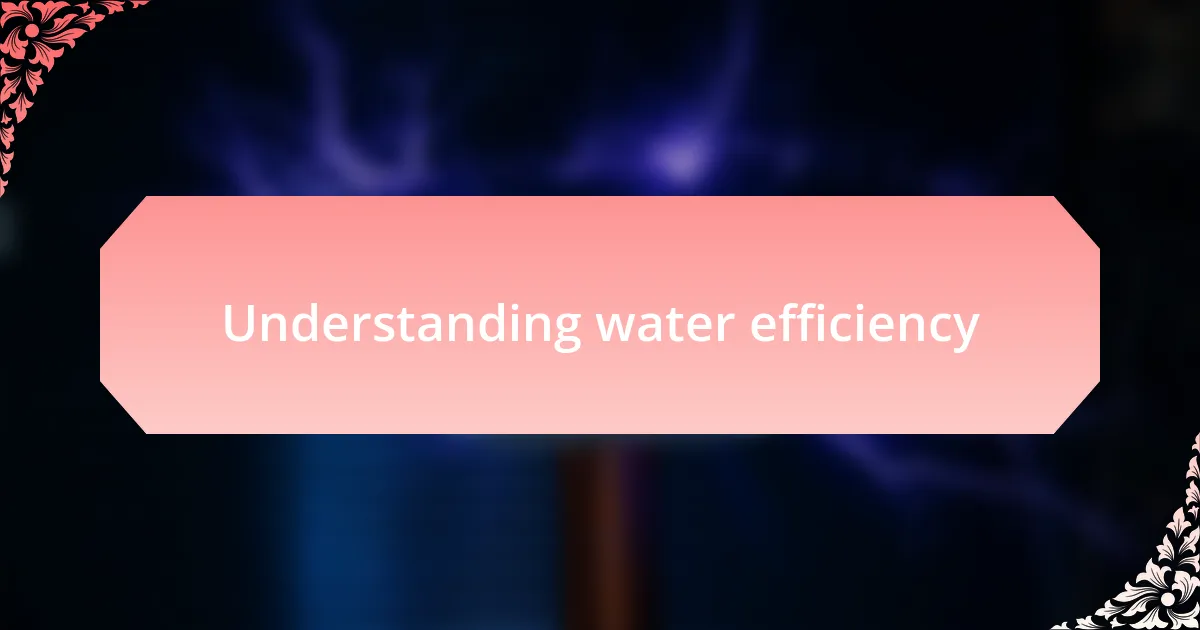
Understanding water efficiency
Understanding water efficiency is more than just a trend; it’s a necessity. I remember the time when I noticed my water bill skyrocket right after a particularly dry month. It dawned on me how integrated water use is in our daily lives—everything from washing dishes to taking long showers has its impact. Have you ever considered how much water your habits really consume?
One of the simplest ways to grasp water efficiency is by realizing just how little of it is available for our daily use. Did you know that only about 1% of Earth’s water is fresh and accessible? The numbers can be staggering, and they push me to think differently about my personal water use. Whenever I turn on the tap, I’m often reminded of the scarcity of this vital resource, which reinforces my commitment to use it wisely.
I’ve found that small changes can lead to significant improvements. For instance, installing low-flow showerheads not only conserves water but can lower my energy costs as well. It’s satisfying to see those small tweaks make a difference, and it really makes me wonder—what other easy adjustments can we all implement in our lives for greater water efficiency?
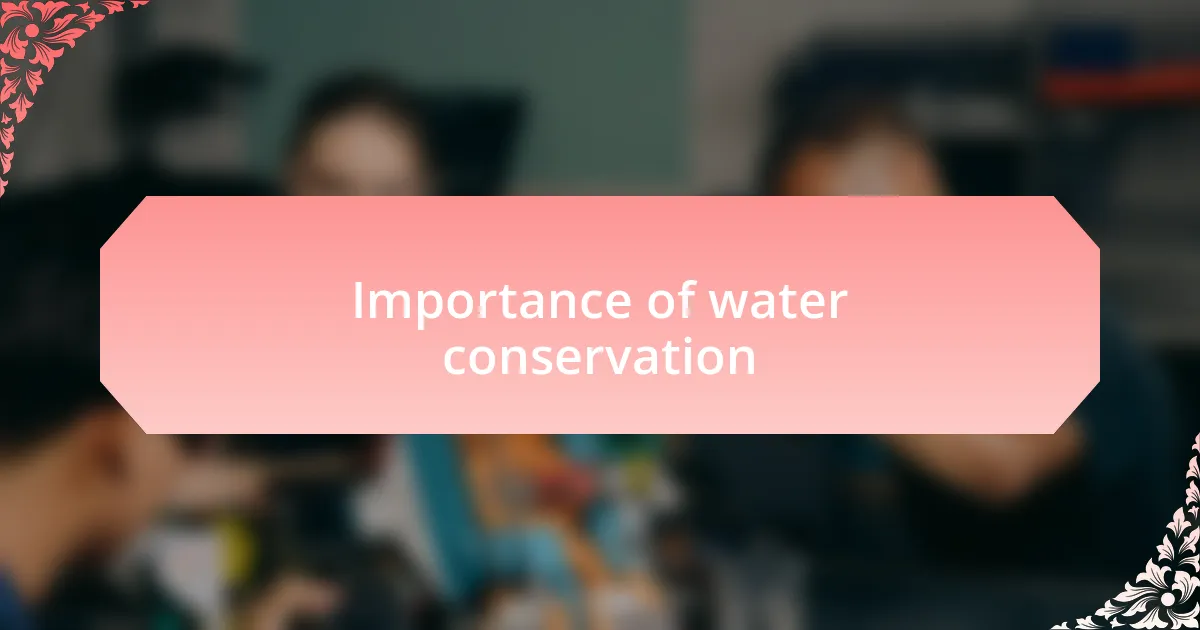
Importance of water conservation
Water conservation holds immense importance, not just for our environment, but for our future. I vividly recall a summer when my local reservoir levels dipped alarmingly low. It was a wakeup call—when we waste water, we jeopardize not just our lifestyles, but also the ecosystems that rely on this precious resource. Have you ever thought about how your daily water usage might affect wildlife beyond your backyard?
Moreover, conserving water can directly impact our energy consumption, too. For example, when we reduce hot water use, we decrease the energy required to heat it—something I noticed firsthand when I changed to cold water washes. Why not take that one step further by embracing water-wise appliances? The savings can be quite remarkable, both financially and environmentally, and it really struck me how interconnected our habits are with broader energy conservation efforts.
Ultimately, the ripple effects of water conservation extend far beyond individual households; they touch entire communities and our planet. I often reflect on how a collective shift in mindset can cultivate a culture of sustainability. What if we all committed to being more intentional with our water use? It could transform not only our local environments but also shape a more sustainable future for generations to come.
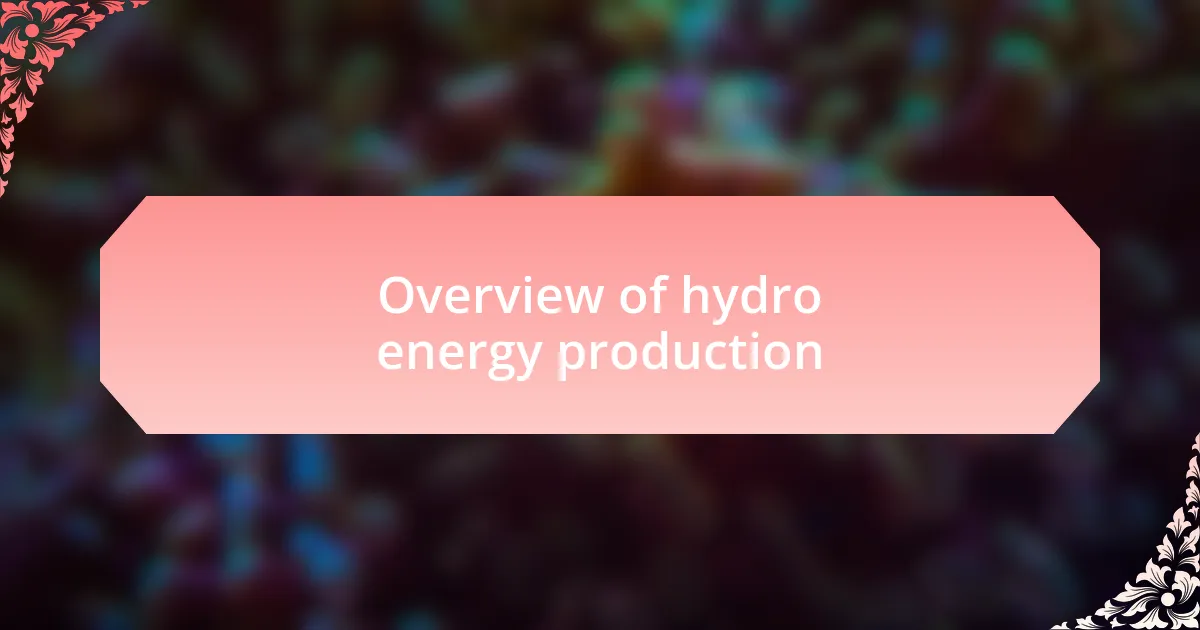
Overview of hydro energy production
Hydro energy production harnesses the power of moving water, primarily through dams or river systems, to generate electricity. There’s something awe-inspiring about observing a waterfall and realizing it has the potential to power homes and industries. Have you ever stood by a river, feeling its force, and imagined it generating the electricity that powers your daily life?
In my experience, witnessing a hydroelectric plant in action was nothing short of eye-opening. The sheer scale of water flowing through turbines demonstrated how nature’s flow can be transformed into clean energy. It made me appreciate the delicate balance we must maintain in utilizing this resource—too much interference can disrupt ecosystems reliant on natural water levels.
Hydropower accounts for a significant portion of the world’s renewable energy supply, standing tall as a pillar in the fight against climate change. I’ve learned that this method not only reduces greenhouse gas emissions but also provides a reliable energy source that can adjust to demand. How incredible is it to think that with each drop of water flowing through a dam, we’re tapping into a sustainable future? The potential of hydro energy is vast, but it’s crucial that we embrace this power with a mindset of sustainability and responsibility.
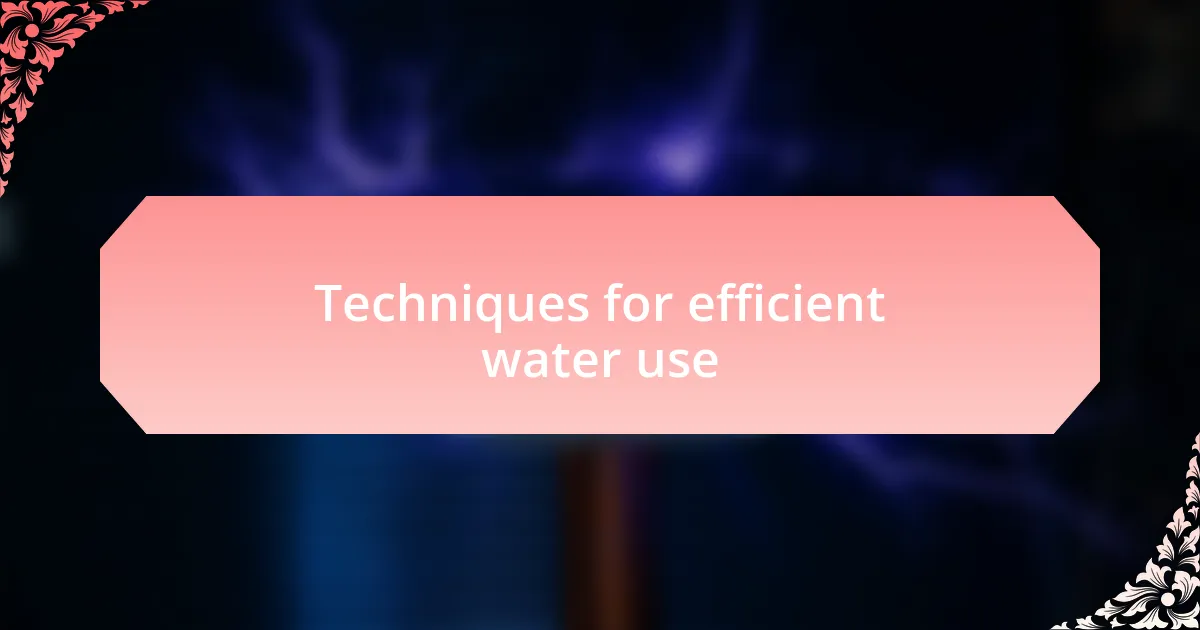
Techniques for efficient water use
Water conservation is essential for maximizing the benefits of hydro energy production. One technique I’ve often used is rainwater harvesting, which involves collecting and storing rainwater for various uses. I remember the first time I set up my rain barrel; it felt rewarding to think that I was reducing my reliance on municipal water while also supporting the local ecosystem. Have you ever considered how just a small change in your water management can contribute to broader sustainability goals?
Another effective strategy is implementing smart irrigation systems. These systems adjust the water supplied to plants based on conditions, ensuring that water is used efficiently. When I first had a smart timer installed in my garden, I was amazed by how much water I saved without sacrificing the health of my plants. Isn’t it fascinating how technology can optimize our resources and help us create a greener world?
Furthermore, I often remind myself of the importance of regular maintenance of water fixtures. Leaky faucets or pipes not only waste water but can also lead to significant energy loss in hydro systems. I once fixed a dripping faucet that had been bothering me for weeks and was surprised by how much my water bill decreased the following month. Why wait for a problem to escalate when small preventive actions can lead to substantial water savings?
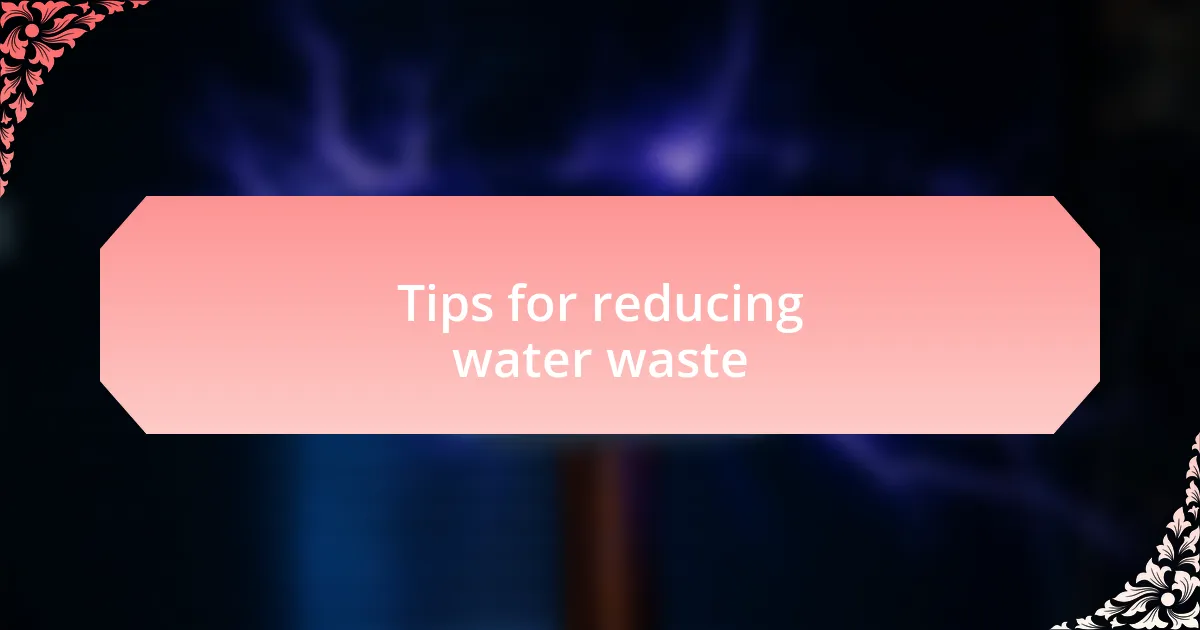
Tips for reducing water waste
One simple yet effective way to reduce water waste at home is by using a broom instead of a hose to clean driveways and sidewalks. I remember the first time I made the switch; I felt a sense of accomplishment knowing I was conserving water while still getting the job done. Have you ever considered how easy it is to make small changes that collectively have a significant impact on our water resources?
Additionally, being mindful of our water use when brushing our teeth or washing our hands can lead to substantial savings. I’ve started turning off the tap while lathering; it’s such a minor adjustment, yet it struck me when I noticed my family’s water bill decrease. How often do we forget that every drop counts, especially when it comes to our daily routines?
Lastly, I advocate for using water-efficient appliances, such as dishwashers and washing machines. When I upgraded to a high-efficiency model, I was surprised at how much less water it consumed compared to my old machine. I think it’s empowering to realize that investing in better technology not only supports our wallets but also contributes to broader environmental goals. What upgrades have you considered to make your home more water-conscious?
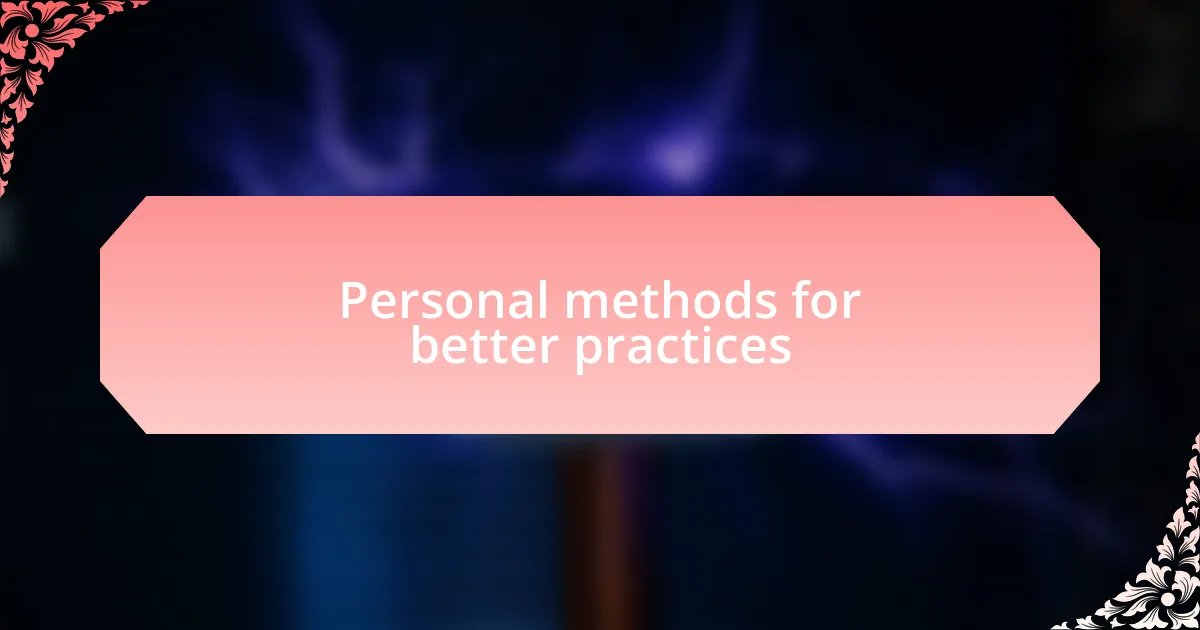
Personal methods for better practices
When it comes to personal methods for better water practices, I’ve found that collecting rainwater is a game changer. I set up a simple rain barrel in my backyard. Watching it fill up during a storm was like seeing my own little reservoir grow, and knowing that I could use that water for my garden filled me with pride. Have you thought about how rainwater could serve multiple purposes, from watering plants to washing the car?
Another practice I’ve adopted is to alter how I water my garden. I now use a soaker hose instead of a traditional sprinkler. The first time I noticed how much more effectively the soaker hose delivered water directly to the soil, I felt a mix of satisfaction and relief since it meant less evaporation and runoff. Isn’t it fascinating how small adjustments in our gardening methods can yield impressive results in water conservation?
I also engage in mindful consumption when it comes to cooking. By using just the right amount of water for boiling or steaming veggies, I not only preserve the nutrients but also minimize waste. Reflecting on my cooking habits, I realized I used to run the faucet without thinking. Now, I measure water more carefully, and it feels like a small victory every time I do a meal prep. How often do we overlook the little things that collectively save water in our everyday lives?
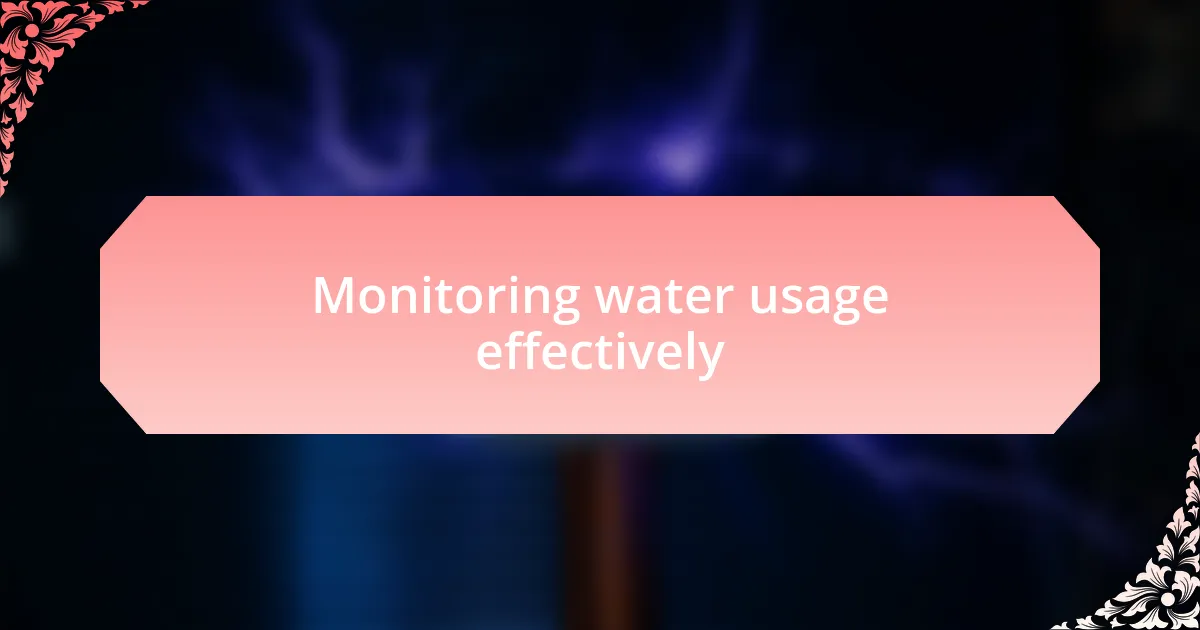
Monitoring water usage effectively
Monitoring water usage effectively can truly transform our awareness of water conservation. One technique I find invaluable is tracking my water bill each month. Not only does it serve as a financial motivator, but I’ve noticed patterns over time that reveal my usage habits. Have you ever taken a close look at yours? I discovered that my water consumption spikes during certain seasons, prompting me to adjust my routine accordingly.
I also utilize simple technology tools to keep tabs on my daily water usage. A friend of mine introduced me to a water-monitoring app that tracks usage in real-time. The first time I saw the immediate impact of my activities—like a long shower or leaving the tap running while brushing my teeth—I was shocked. Have you ever counted how much time you spend on daily habits? This level of insight helped me make conscious changes, reducing my overall consumption significantly.
Additionally, I engage in regular conversations with family about our water usage. Sharing our experiences fosters accountability; sometimes we challenge each other to cut down on usage in creative ways. Reflecting on a recent friendly competition, we each aimed to reduce our shower times, and I have to say, it turned into a fun way to bond while being mindful of our habits. How often do we sit down and discuss sustainable practices with those around us? Ultimately, combining dialogue with monitoring helps all of us stay committed to conserving this precious resource.